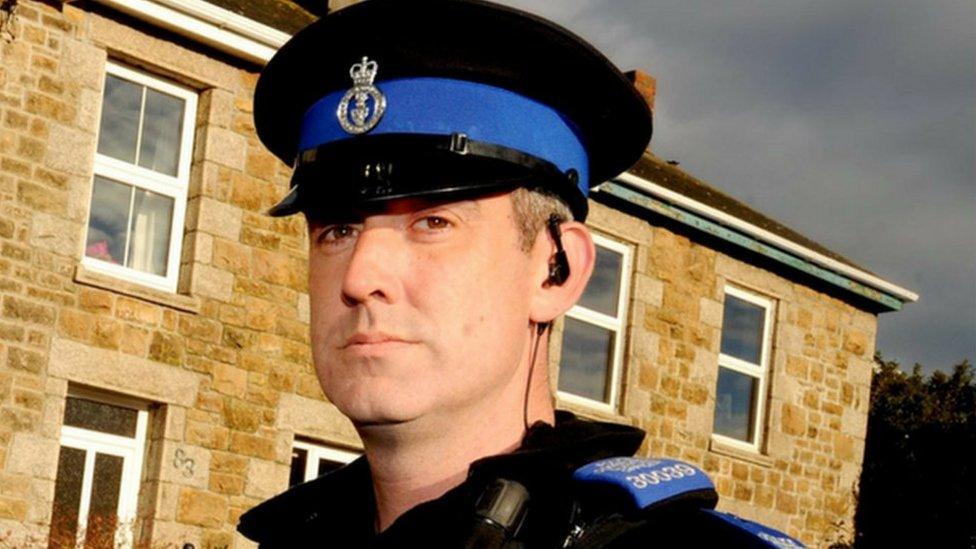Thousands of police on the beat without current background checks
- Published
- comments

Thousands of police officers across the UK have not had up-to-date background checks to ensure they are suitable to serve.
Figures reveal 90% of officers employed by one force have not been vetted in line with current policy.
Vetting aims to help prevent corruption in the police by checking an officer or potential officer's background.
Her Majesty's Inspector of Constabulary Mike Cunningham said forces "need to address this matter urgently".
Responding to a request from the BBC , externalunder the Freedom of Information (FoI) Act, Northumbria Police admitted almost 3,000 or nine out of ten of its officers still had not been vetted in line with the most recent policy.
The latest vetting guidelines were introduced, external by the Association of Chief Police Officers. All new police officers and staff are expected to be vetted, while serving officers are expected to undergo retrospective checks. Prior to 2012, forces had their own vetting procedures.
Out of 48 police forces, 17 responded in full to the FoI request. About 14,000 police officers in England, Wales and Northern Ireland had not undergone up-to-date checks.
Mr Cunningham said the "unacceptable" backlog needed to be given higher priority within forces, and called for "appropriate levels of resources" to be allocated.
He said: "I think it is simply a question of volume outstripping the supply of people to do the tasks.
"There is no doubt that forces who have not vetted or re-vetted large numbers of their staff are subject to a vulnerability."

PCSO 'would have been rejected'

Peter Bunyan would have been rejected as a potential PCSO under the current vetting policy
Peter Bunyan was a PCSO employed by Devon and Cornwall Police.
He was jailed for misconduct in 2013 after a court heard he used the police database as a "dating agency" and turned down his police radio on shifts while he had sex with women.
He was employed in 2003, three years before Devon and Cornwall Police set up its Central Force Vetting Unit, and nine years before the Association of Chief Police Officers' National Vetting Policy was introduced.
A subsequent investigation by the Independent Police Complaints Commission revealed that if Bunyan had gone through the current vetting policy used by the force "he would have been rejected".
But by the end of 2016 there were still 62 PCSOs employed by Devon and Cornwall Police who had not been through the vetting process and 181 police officers.
Devon and Cornwall Police said it was working hard to tackle the delays and had reduced the backlog to 73 police officers and 55 PCSOs.
In October 2016 Bunyan was jailed for 24 years for raping two girls aged between three and five.

Reducing backlog
Vetting aims to help prevent corruption in the police service by checking an officer or potential officer's background.
The process, which can take several months, looks at an individual's finances, employment history and family associations, as well as a detailed search for any convictions.
Police Community Support Officers (PCSOs) are also affected by the delays.
Chief Constable Martin Jelley, from the National Police Chiefs' Council, said forces were "working hard to reduce any backlog".
The Police Federation, which represents rank and file officers, said it was disappointed to see such huge backlogs in vetting.
Its chairman Steve White said: "Police officers are privy to an enormous amount of confidential data and information.
"What we can't risk is the prospect of dishonest people abusing that position and being able to access this information or exploit situations for their own ends."
The figures show the number of officers still waiting to be vetted under the current policy at the end of 2016.
Northumbria Police said there was "a planned programme of retrospective vetting for all officers and staff, who are not vetted at the 2012 standards due to start".
A spokesman said: "The policy on vetting changed in 2012. This meant Northumbria, like all forces, had a number of officers and staff already in post who had been vetted to previous standards. When an individuals' vetting expires or their role changes their vetting is renewed to the required standard.
"Northumbria Police is fully compliant with the national policy on vetting."

